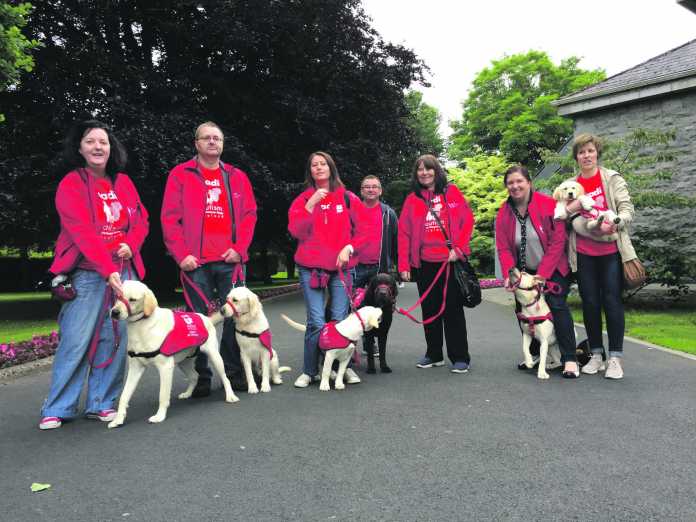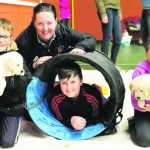
 THE average cost of training a dog for a child with Autism is €15,000 but the benefits are priceless.
THE average cost of training a dog for a child with Autism is €15,000 but the benefits are priceless.
Autism Assistance Dogs Ireland (AADI) has opened up a world of possibilities for children with autism by providing highly trained assistance dogs to help them achieve a level of independence that would be highly improbable in normal circumstances.
The dogs are provided free of charge but the demand has increased to such an extent that there is now a five year waiting list for a service that has benefitted several Limerick families over the past seven years.
Established seven years ago in Mallow, AADI is a small dynamic charity with two full-time and two part-time staff supported by more than 50 dedicated volunteers who provide essential services and fundraising to support the 18 month training course for the dogs.
Vivienne Collopy, who has charge of the Limerick AADI operation, explains that assistance dogs increase safety levels for children with Autism who have a tendency to ‘bolt’ and have no sense of danger.
“In public places, the child is attached to their assistance dog, which is under the control of an adult at all times. This makes outings possible and pleasant, creating a sense of inclusion for the whole family, which otherwise may not have been possible.
The dog also helps to lower the child’s anxiety levels in situations they may otherwise find overwhelming and can help to improve social and vocal skills.
“They allow for greater public understanding that the child has a disability and is not just having a tantrum. The dog also gives the child greater independence and helps them to learn responsibility by becoming involved with feeding and grooming routines. The dog generally creates a positive change in behaviour and can be a source of comfort when upset.
The dog wears a specially designed jacket which is connected to a belt around the child’s waist. There is also a handle on the dog’s jacket for the child to hold on to. The parent holds onto the lead controlling and giving instruction to the dog.
The dogs are taught to walk ahead with the child and to respond to various commands including left and right turns, standing at kerbs and locating objects such as doors and crossings.
Vivienne explains that all assistance dogs have a high standard of obedience and social behaviour as they have to access to public places including shops, restaurants and cinemas.
“The dog lives with the family in the home environment and it is recommended that the dog goes everywhere with the family.
“We provide assistance dogs to children between the ages of three and thirteen on the Autism Spectrum. Specific criteria are required before being accepted for an Assistance Dog, if these criteria are met a detailed application form is sent out to the families to be completed and returned. At this stage they are placed on a waiting list prior to a home assessment.
It costs €15,000 to provide a fully trained dog to a child with autism. AADI relies solely on donations, receiving no funding from the government to breed, train or place these assistance dogs.
The charity, which suspended its waiting list two years ago, has since received over 800 enquiries.
The success of a new breeding programme, following the birth of the national charity’s first litter of puppies, has provided some hope that the waiting list can be shortened in the medium term.
The eight Golden Retriever/Labrador cross pups are part of a programme initiated two years ago to tackle the five-year waiting list for children with autism who need a highly-trained assistance dog.
With the success of its new breeding programme, AADI now has ambitious plans to train and place 20 dogs a year.
Chief executive and founder Nuala Geraghty said: “These dogs are life-changers for the children and their families. As our charity relies heavily on volunteers, we urgently require funds to support the puppies in their journey to become highly-trained assistance dogs. Our organisation depends entirely on the generosity of the public to raise the €15,000 needed to train each pup. We are asking people to donate money or to get in touch with us if they have an idea for a fundraising initiative.”
The training process includes the dog being placed with a volunteer foster family when they are between two to 15 months old. The dogs are house trained, taught basic obedience and are socialised in several different environments to prepare them for their life as an assistance dog.
The dog then returns to the centre in Mallow where it enters its final stages in training. This takes a further five months at which time it is matched to a suitable child and family who will have already been assessed and accepted for an assistance dog. The family goes through intensive training to ensure they are confident before taking the dog home and this is then followed up by aftercare visits to the home by the AADI Instructor.
AADI also provide companion dogs for children and adults on the autism spectrum. These are highly trained dogs that have had some intensive training but do not have the required skills to become a certified assistance dog with full public access.
These dogs have been shown to improve physical and mental health in people with a disability. The day-to-day care of the dog helps increase the level of responsibility and confidence in the owner as well as providing opportunities for social interactions.
To ensure a supply of suitable dogs, AADI operates a puppy programme consisting of 12 to 15 puppies from eight weeks to 15 months of age that are placed with volunteer foster families throughout the Munster region. All costs including equipment, vet fees and dog food are covered by AADI.
The charity also has its our own breeding programme and have just had their first litter of Golden Retrievers crossed with Labradors in February. The long-term strategy plan is to develop the breeding programme to increase its success rate in producing suitable pups for training and placement.
For more information, see www.autismassistancedogsireland.ie
Read Lynn’s story here.



















